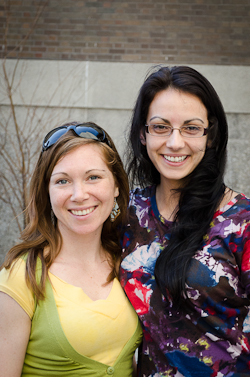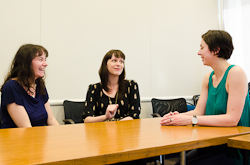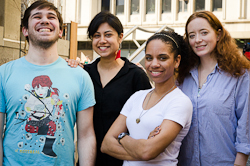Student-initiated seminars offer a new way of learning at the Faculty of Law.
|
|
|
|
|
|
“The student-initiated seminar is an example of what sets McGill apart,” says Eden Alexander, an organizer of the Reconciliation, Truth and Indigenous Perspectives course, one of three such seminars recently offered at the Faculty, along with Sexual Assault Law and Critical Race Theory.
Each student-initiated seminar has an associated Faculty member – in this case, Professors Colleen Sheppard, Vrinda Narain and Adelle Blackett, respectively – but the class is planned, organized, and led by the students themselves. “It is an aspect of my legal education that I am proud of and that awoke in me competencies not otherwise stirred,” says Alexander.
The original organizers must develop their own syllabus, by reading widely, consulting experts, and soliciting syllabi from other law schools. Then they settle on a reading list, add the relevant jurispridence, and invite guest speakers. “It’s quite an organizational challenge!” says Laure Prévost, a co-organizer of last year’s Sexual Assault Law seminar.
The motivation for all this effort comes from students who want to explore a particular area of the law in more depth than is possible in the core curriculum. “We were all there as a result of our genuine interest in the topic,” recalls Julia O’Byrne, the syllabus coordinator for the Sexual Assault Law seminar. In that format, she says, “we could really set our own agenda, so there was more time for nuance and discussion, and to really engage with the materials. What we put in, we got out, times ten.”
Do organizers hope their seminars will eventually become a regular class at McGill? “It’s possible,” says Prévost, pointing out that Animal Law was a student-led seminar three years in a row before becoming a regular course. Further, Professor Sheppard is teaching the Truth, Reconciliation and Indigenous Perspectives Course in the winter 2013 semester. “I believe we have a duty as a Faculty to teach about these issues,” says Sheppard, “especially while the Truth and Reconciliation Commission is taking place in Canada.”
That said, however, student-led seminars have benefits all their own. For one, classes are small enough that everyone has the chance to speak. “I left that class each week feeling like I had been able to express everything I thought about the readings,” says O’Byrne, “and that the other students had genuinely listened to and engaged with my ideas.”
Furthermore, student-led seminars “help students get actively engaged in their legal education, as well as feel a sense of belonging in the Faculty of Law,” adds Emily Elder, a co-organizer of the Critical Race Theory course.
“The student-led seminar format is innovative and possibly unique in Canada, if not the world,” Elder continues, noting that the Critical Race Theory course organizers received requests for their syllabus, as well as the Faculty’s model for creating a student-led seminar, from the faculties of law at Dalhousie, Ottawa and Osgoode Hall.
This does not surprise Eden Alexander. “As McGill demonstrates the success of such initiatives,” she says, “we may see radical ideas such as this pop up at law faculties across the country—Or at least, I can hope.”
In the Winter 2013 semester, the Faculty will offer Professor Sheppard’s course as well as a three-credit student-led seminar on Critical Race Theory, supervised by Dr. Armel Brice Adanhounme, Wednesday mornings in room 316. More options are under discussion for 2013-2014.
Text by Bridget Wayland
Photos by Lysanne Larose
[ GO BACK TO CURRENT EDITION OF FOCUS ONLINE ]



